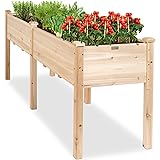Raised Garden Beds Outdoor, 4x2x1FT Galvanized Metal Raised Garden Bed with Cover and Greenhouse, Large Oval Outdoor Planter Garden Boxes for Tomato, Fruit, Vegetable, Flower
$69.99 (as of 14:38 GMT -05:00 - More infoProduct prices and availability are accurate as of the date/time indicated and are subject to change. Any price and availability information displayed on [relevant Amazon Site(s), as applicable] at the time of purchase will apply to the purchase of this product.)Best Choice Products 72x23x30in Raised Garden Bed, Elevated Wood Planter Box Stand for Backyard, Patio, Balcony w/Divider Panel, 6 Legs, 300lb Capacity - Natural
17% OffAre you ready to start your own vegetable garden? If yes, then this beginner’s guide is for you. Vegetable gardening can be a fun and rewarding experience that not only provides fresh produce but also helps you save money on groceries. In this article, we will cover everything you need to know about starting your first vegetable garden.
Introduction to Vegetable Gardening
Vegetable gardening is the practice of growing edible plants in your backyard or any other available space. It involves cultivating crops such as tomatoes, lettuce, carrots, peppers, and many more. With the right tools, techniques, and knowledge, anyone can create their own thriving vegetable garden.
Choosing the Right Location and Soil for Your Garden
The location of your vegetable garden should receive at least six hours of sunlight per day. Avoid areas with heavy shade or windy spots. Also, make sure there are no underground utilities or pipes that could interfere with plant growth. When it comes to soil, choose one that drains well and has good nutrients. You can add compost or manure to enrich the soil if necessary.
Selecting the Best Vegetables to Grow
When selecting which vegetables to grow, consider factors like climate, seasonality, and personal preference. Some popular choices include tomatoes, lettuce, spinach, radishes, green beans, and zucchini. Make sure to research each crop’s growing requirements, including water needs, spacing, and harvest time.
Planting and Caring for Your Vegetables
Once you have chosen your vegetables and prepared your plot, it’s time to plant! Follow the instructions on the seed packets or plant labels, and give each plant enough room to grow. Keep the soil moist but not overwatered, and avoid using chemical pesticides or fertilizers. Instead, use natural methods like companion planting and beneficial insects to keep pests away.

Common Pests and Diseases in Vegetable Gardens
Despite your best efforts, pests and diseases may still affect your vegetable garden. Common problems include aphids, slugs, snails, blossom end rot, and powdery mildew. To prevent these issues, practice good garden hygiene by removing dead plants and debris. You can also use natural remedies like neem oil or garlic spray to repel pests.
Harvesting and Storing Your Homegrown Produce
After several weeks or months of careful tending, it’s time to reap the benefits of your hard work! Harvest your vegetables when they are ripe and full-grown. Store them properly in the fridge or freezer to extend their shelf life. Enjoy your homegrown produce in salads, stir-fries, soups, and more.
In conclusion, starting your own vegetable garden can be an exciting and rewarding experience. By following these tips and taking care of your plants, you can enjoy fresh, healthy produce all year round.















































